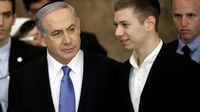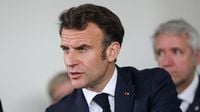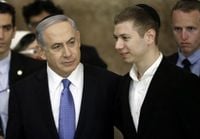In a heated exchange on social media, Yair Netanyahu, the son of Israeli Prime Minister Benjamin Netanyahu, has publicly insulted French President Emmanuel Macron following Macron's statements regarding the potential recognition of a Palestinian state. This incident, which occurred on Saturday, April 12, 2025, has sparked significant controversy and highlighted the ongoing tensions between Israel and France over the Israeli-Palestinian conflict.
Yair Netanyahu, 33, who currently resides in Florida, reacted strongly to Macron's comments made three days earlier, on April 9, where the French president indicated that France might recognize a Palestinian state during a conference co-chaired with Saudi Arabia at the United Nations in June. Macron emphasized the legitimate rights of both Palestinians and Israelis to live in peace and security, a sentiment that he has reiterated in various forums.
In response to Macron's announcement, Yair Netanyahu took to the social media platform X (formerly Twitter) to express his disdain, writing, "Va te faire voir!" which translates to "Screw you!" He followed this up with a series of statements supporting the independence of various regions, including New Caledonia, French Polynesia, Corsica, and the Basque Country, while also mistakenly referencing "Guinea française," likely confusing it with French Guiana. His remarks concluded with a call to "Stop the neo-imperialism of France in West Africa!"
This outburst is not an isolated incident for Yair Netanyahu, who has built a reputation for his controversial and often inflammatory rhetoric on social media. Known for his far-right views, he has previously made headlines for his extreme positions and insults directed at political opponents and international leaders alike. His comments regarding Macron have drawn considerable attention, especially given the historical context of France's colonial past and the sensitive nature of the Israeli-Palestinian conflict.
Macron's proposal to recognize a Palestinian state has been met with backlash from various political factions in Israel. Israeli Foreign Minister Gideon Saar condemned the potential recognition, labeling it as a "reward for terrorism" and dismissing the Palestinian state as a fictitious entity. The Israeli government has consistently opposed the two-state solution, which is viewed by many as a viable path to peace in the region.
The Hamas organization, on the other hand, welcomed Macron's statements, interpreting them as a significant step forward for the Palestinian people. Mahmoud Mardawi, a leader within Hamas, stated, "France, as a politically influential country and a permanent member of the Security Council, has the ability to guide just solutions and push for the end of occupation and the fulfillment of the Palestinian people's aspirations."
This exchange between Yair Netanyahu and Emmanuel Macron underscores the complexities of international relations concerning the Israeli-Palestinian conflict. As Yair Netanyahu continues to use his platform to voice his opinions, his father's government faces increasing scrutiny over its handling of relations with both allies and adversaries.
Yair Netanyahu's comments also reflect a broader trend among far-right politicians and activists who often resort to aggressive rhetoric when discussing sensitive geopolitical issues. His remarks have attracted both support and condemnation, with some viewing him as a provocateur while others criticize his lack of diplomatic decorum.
The historical implications of Yair Netanyahu's comments cannot be overlooked, particularly when he juxtaposes Macron with figures from World War II, such as Philippe Pétain. This comparison serves to amplify the tensions surrounding France's colonial legacy and the contemporary struggles of the Palestinian people.
As the situation evolves, it remains to be seen how both Macron and the Israeli government will respond to this exchange. The French president's willingness to engage in dialogue regarding Palestinian statehood may set the stage for future diplomatic efforts, while Yair Netanyahu's continued provocations could further complicate relations between Israel and its allies.
In conclusion, the exchange between Yair Netanyahu and Emmanuel Macron highlights the ongoing complexities of international diplomacy in the context of the Israeli-Palestinian conflict. As both leaders navigate their respective political landscapes, the implications of their words and actions will undoubtedly resonate beyond their immediate exchanges.






